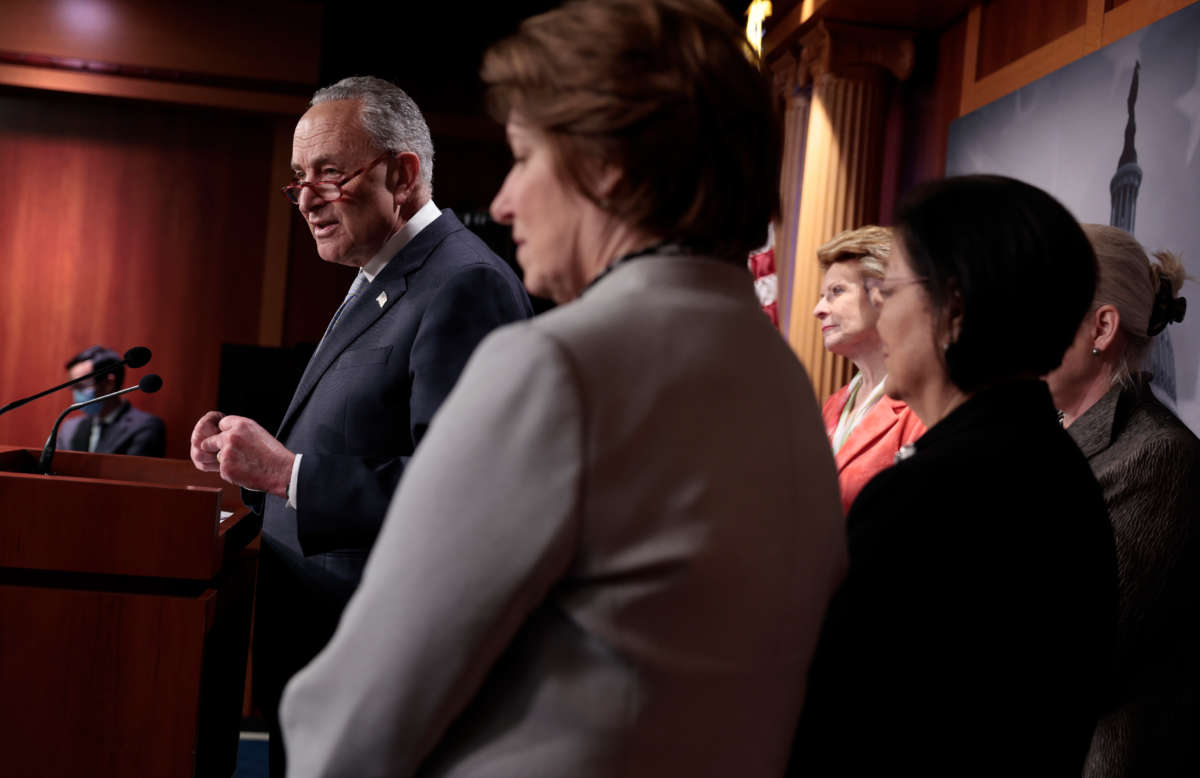Truthout is an indispensable resource for activists, movement leaders and workers everywhere. Please make this work possible with a quick donation.
Democrats in the United States Senate say they plan to bring up a vote next week to pass legislation that would codify abortion protections recognized in the 1973 landmark Supreme Court ruling Roe v. Wade — but their action will likely be an exercise in futility, as they do not have the votes to get it past a 60-vote filibuster threshold.
The vote is in reaction to the leaked draft opinion from the Supreme Court, written by conservative Justice Samuel Alito, that suggests the institution is set to overturn the half-century-old precedent protecting a person’s right to access abortion services throughout the country.
Senate Majority Leader Chuck Schumer (D-New York) confirmed the vote would happen.
“I intend to file cloture on this vital legislation on Monday which will set up a vote for Wednesday,” he said on the Senate floor on Thursday.
In a Twitter post, Schumer said the vote was necessary so that “Americans will see where every single Senator stands” on the issue.
That comment from the majority leader is perhaps a recognition of the fact that the bill is doomed to fail. Democrats are nowhere near the 60 votes needed to overcome the Senate filibuster, and the vote is being seen by many as a political gesture rather than a realistic means of addressing the potential end of abortion rights protections for millions of Americans.
“The plan is little more than an effort to send a political message before the midterm elections and a seismic ruling that could have major legal, cultural and electoral consequences, with deep significance for voters across the political spectrum,” wrote The New York Times’s Annie Karni in a report on the vote.
Even if Democrats eliminated the filibuster completely, however, it’s unclear whether they’d be able to get every member of their own caucus on board with passing abortion protections.
The legislation that’s up for a vote, the Women’s Health and Protection Act, passed easily in the House last year but was blocked when it reached the Senate by Republicans and Sen. Joe Manchin, a conservative Democrat from West Virginia. Manchin opposed the bill on the grounds that it provided too many protections for individuals when it came to abortion rights.
Since his vote to block the legislation in February, Manchin has not indicated any shift in his stance on the issue, nor has he said much about support for a watered-down version of the bill, offered by Sen. Susan Collins (R-Maine), that would establish very limited protections for abortion across the country while still allowing states the ability to place harsh restrictions on access to the medical procedure.
Some may view any efforts to negotiate with Manchin as futile because of the inconsistency between Manchin’s eventual vote and his private conversations with progressive Democrats on other pieces of legislation throughout the past year. In fact, one Democratic insider, speaking to Axios in January about these discussions with Manchin, said that working with him was like “negotiating via Etch A Sketch.”
A terrifying moment. We appeal for your support.
In the last weeks, we have witnessed an authoritarian assault on communities in Minnesota and across the nation.
The need for truthful, grassroots reporting is urgent at this cataclysmic historical moment. Yet, Trump-aligned billionaires and other allies have taken over many legacy media outlets — the culmination of a decades-long campaign to place control of the narrative into the hands of the political right.
We refuse to let Trump’s blatant propaganda machine go unchecked. Untethered to corporate ownership or advertisers, Truthout remains fearless in our reporting and our determination to use journalism as a tool for justice.
But we need your help just to fund our basic expenses. Over 80 percent of Truthout’s funding comes from small individual donations from our community of readers, and over a third of our total budget is supported by recurring monthly donors.
Truthout’s fundraiser ended last night, and we fell just short of our goal. But your support still matters immensely. Whether you can make a small monthly donation or a larger one-time gift, Truthout only works with your help.
